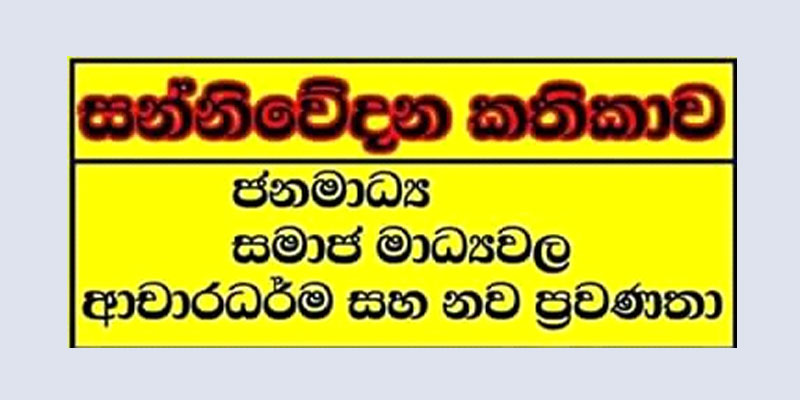No. 325, Bauddhaloka Mawatha, Colombo 07 | Tel : 0112693272 | Fax: 0112693271

Media, Social Media Ethics and New Trends
The second session of the “Sanniwedana Kathikawatha” programme on Zoom Technology based on "Media, Social Media Ethics and New Trends" was held on 16th February 2021 at the Sri Lanka Press Council. Veteran media commentator and lecturer Daya Sri Narendra Rajapaksa also participated in the event. All those interested were also given the opportunity to join the discussion through Zoom technology.
Discussions on media activity in Sri Lanka and the ethical approach to media practice have arisen on various occasions. For the second phase of the “Sanniwedana Kathikawatha” communication dialogue, an expert Discussion on Media and Social Media Ethics and New Trends was held with the participation of Mr. Niroshana Thambavita, Press Commissioner of Sri Lanka Press Council, Mr. Suroshana Iranga, Assistant Press Commissioner, Mr. Gamini Kandapola, Journalist and Mr. Daya Sri Narendra Rajapakshe, Resource Contributor.
We intend to present a review of the discourse on social media, personal and social security social responsibility of social media users, which has emerged as a new trend in media activity.
There have been a number of media-centric issues throughout the history of the media in Sri Lanka, and a similar situation can be seen in recent times. The majority of those involved in the discussion were of the opinion that modern human beings can be seen deciding the fate of their lives by using mass media and social media to convey human emotions that are based on every human activity.
Discussions on media and social media ethics in this country have taken place at various times and are still taking place today. Has this situation led to the formation of a media user friendly culture? Another objective of the scholarly discourse was to show the extent to which it causes.
It was the intention of most of the participants to focus on the current media culture trends, various dimensions and challenges that have arisen in the face of the overall mass media activity and to take the audience to a new approach. The impact it has had on the mainstream media and the contribution it has made to the direction of social action as well as to the building of the social model is immense and we need to build a broader dialogue on this.
"When commenting on social media, the relevant party must act responsibly. There is a technical side to commenting on this. Commenting to people using social media is something that happens on social media.
The vast majority of people have knowledge of technology but not many know how to use it. Social media is a new medium, the mobile phone transmits information faster than the computer, so the response is very fast,” said journalist Gamini Kandepola. The openness that comes with the inherent qualities and structure of social media results in both positives and negatives.
There is a time in the history of the media where ethics have been violated. The remnants of technology, education and the media are still there today. Narendra Sri Rajapaksa, who was present at the event, said that a journalist should use his pen and camera to report events in a way that does not damage the character or image of a person.
Press Commissioner Niroshana Thambawita who participated in the discussion expressed the following views. Over time, the various dimensions that we build on each issue to build a better society have become ethical. These can be written and unwritten.
We must first identify the primary need for the medium of communication as a medium of communication. I believe that the primary need for communication is to foster co-operation between people, cultures and nations, and to further preserve the resulting unity.
If we assume that social media is water, adding toxins to the water will make the person suffer from various diseases and if we add drugs to the water, the person will become healthy. So social media can be likened to that .There is no system in Sri Lanka to mediate or monitor the actions of social media. Anyone can use social media. Anyone can become a part of it. Assistant Press Commissioner Suroshana Iranga also made some comments. Social media is not legal in Sri Lanka. But the global situation is quite different. They have formal mechanisms in place to regulate social media.
Our country too can follow their example and develop a system that suits them. In France and Germany, social media companies are being held accountable for their social media content. But the situation in Third World countries is completely different. The user is responsible. Some countries use this intermediate method. Australia is an example of that.
Postmodernism has given rise to social media and the use of social media accordingly .People in Europe have correctly identified the use of social media in those countries .Problems in using it in third world countries are the real characteristics of the individual is reflected in the media .The problem is not with social media but with third world users who use it. This was someone’s idea.
A participant in the discussion added that this is more or less a dispersal process in the world, challenging the existing situation and creating new dimensions and integration into the socio-economic and political spheres.
The media production that takes place without professionalism, makes a powerful impact on the individual, social organizations as well as to the society.Their view was that social hatred has a powerful impact on social organizations as well as society, and that instead of social harmony, social hatred represents instances within our society which causes damage to individual images as well as the breakdown of the socio-economy.
The individual is an activist in the social system. His or her interests and all the things that build around him affect his mental existence and it is a huge problem that can be seen today as it is also transformed into social issues through social media. While the average user who uses social media behaves irresponsibly, a professional journalist should focus on the ethical basis of social media use, such as quality behavior for social promotion. Veteran lecturer Daya Sri Narendra Rajapaksa who participated in the discussion further said that the professional journalist should be careful about being honest, responsible and minimizing the damage.
People living in an information world cannot stop chasing. Competitiveness in the media automatically leads to a breakdown in social integration and credibility, and efforts to highlight the importance of ethics in social media have been successful.


